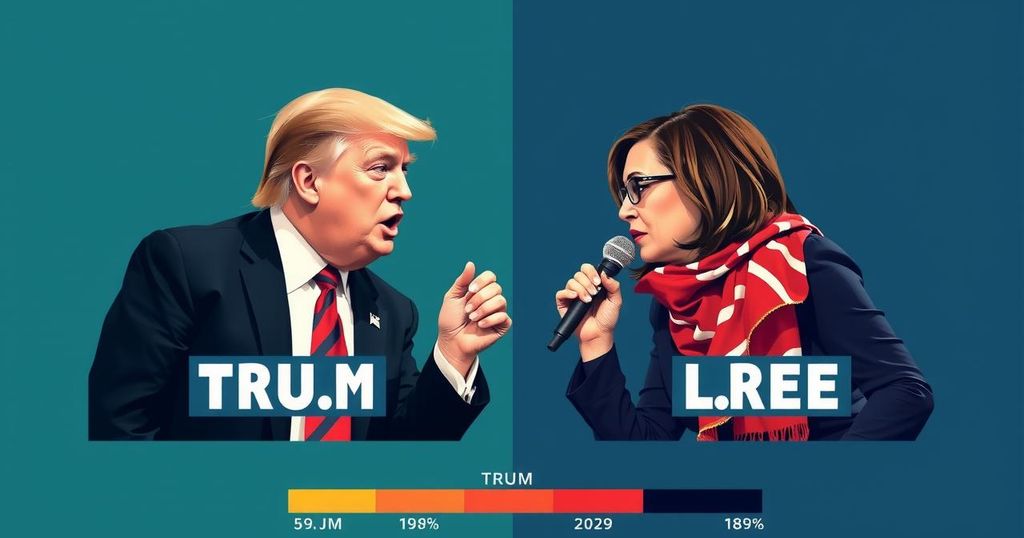Polling Indicates Trump Leads Harris Among Arab Americans, Raising Concerns for Democrats
A recent poll indicates that Donald Trump leads Kamala Harris by 45% to 43% among Arab Americans, signaling a decrease in Democratic support potentially linked to the Gaza conflict. Trump is viewed as more capable of resolving the Israel-Palestine issue, with substantial concern among Arab Americans regarding this conflict. The implications for Harris’s campaign are significant, particularly given her lower support than Biden had among this demographic in 2020.
Recent polling indicates that Donald Trump is slightly ahead of Kamala Harris among Arab American voters, with a lead of 45% to 43%. This polling data, released by Arab News/YouGov, raises alarms for Democrats, suggesting that the ongoing conflict in Gaza is diminishing support from a crucial voting demographic as the presidential election approaches. Notably, Trump is perceived as being more capable than Harris in addressing the resolution of the Israel-Palestine conflict, with 39% favoring him versus 33% for Harris. Both candidates are considered equally favorable concerning their approach to the Middle East overall. When Arab Americans were asked about their primary concerns, 29% identified the Israel-Palestine situation as their foremost issue, followed by 21% prioritizing economic difficulties and 13% naming racism and discrimination. While Trump leads in approval among this group, he is also regarded as more aligned with the current Israeli administration than his Democratic counterpart, by a margin of six points. The sample for this poll consisted of 500 Arab Americans, with results falling within a margin of error of plus or minus 5.93%. The polling results serve as a critical signal to the Democratic Party regarding President Joe Biden’s support for Israel’s actions in Gaza, which may adversely affect Harris’s electoral prospects as Election Day draws near on November 5. A prior survey from the Arab American Institute indicated a near tie between Trump and Harris at 42% and 41%, respectively. Harris’s current support among Arab Americans is significantly lower than Biden’s in 2020, marking an 18-point decrease. Arab American voters play a substantial role in the swing state of Michigan, where their population is dense and where Dearborn is recognized as the first Arab-majority city in the United States. The implications are further underscored by a notable endorsement of Trump from the Mayor of Hamtramck, the first U.S. city with a fully Muslim governance system, who praised Trump as a principled leader. In the 2020 election, Biden won Michigan by a margin of approximately 150,000 votes, in contrast to Trump’s slim victory of about 11,000 votes in 2016. For his part, Trump has actively reached out to Muslim and Arab American voters, criticizing Harris for associating with controversial Republican figures and asserting that her presidency would lead to prolonged turmoil in the Middle East, a situation he claims he could prevent.
The recent polling data highlights a significant shift in voter sentiment among Arab Americans, a demographic known for its political influence, especially in pivotal states like Michigan. The Israel-Palestine conflict has become a salient issue, affecting the popularity of candidates in the current election cycle. With the electorate’s concerns varying from foreign policy to economic issues, the dynamics suggest an evolving landscape as both major parties strive to secure votes. Arab Americans constitute a strategically important voting bloc, particularly in battleground states where their presence can sway election outcomes.
In summary, the Arab-American voting bloc appears to be swaying towards Donald Trump as the election approaches, with recent polling reflecting a narrow lead over Kamala Harris. This shift raises concerns for the Democratic Party, particularly in the context of President Biden’s policies regarding Israel and Palestine. The poll results reveal a demographic increasingly focused on foreign policy issues, particularly the Israeli-Palestinian conflict, while also reflecting a decrease in support for Harris compared to Biden’s previously robust backing in 2020. Thus, the upcoming election could hinge significantly on the attitudes and preferences of this influential group of voters.
Original Source: www.aljazeera.com




Post Comment